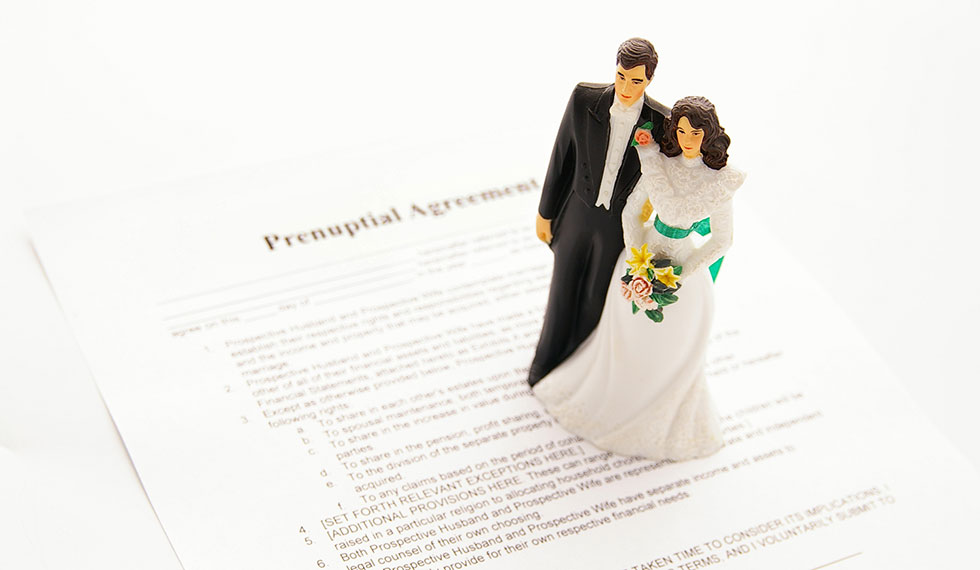Validity of prenuptial agreements in Singapore
Should a husband and a wife decide to get divorced, they may agree on how to handle some issues ahead of time. This agreement is called the prenuptial agreement or antenuptial agreement, which covers matters that are typically subjects of ancillary proceedings. These matters include marital assets, children, and maintenance. Spouses with a prenuptial agreement often feel they are being practical by dealing with potential issues that may arise.
Being contractual in nature, prenuptial agreements are designed to satisfy the basic requirements of any contract. This contract must be supported by consideration, and will be deemed void if it is acquired through a party’s duress, misrepresentation, fraud, unconscionability, or undue influence.
The Women’s Charter (chapter 353) governs many of the issues that parties would agree on in a prenuptial agreement. The validity of a prenuptial agreement in Singapore, therefore, can be a complicated matter.
Section 112 of the Women’s Charter mentions the court's power to order the division of matrimonial assets, the sale of these assets, and even the division of proceeds from the sale of these assets between divorcing spouses. The court will divide the assets in a manner it deems to be equitable and just, referring to a prescribed list of factors the court is required to account for when such order is made.
Section 114 of the Women’s Charter similarly states that the court is required to consider the circumstances of the case, as well as another prescribed list of factors. By doing so, the court will be able to determine the appropriate maintenance amount one party is to pay to the other.
The court scrutinises the prenuptial agreement in a divorce proceeding, and will not uphold the contract should it contravene the Women's Charter requirements.
How will the court scrutinise the prenuptial agreement?
- By determining if the prenuptial agreement's terms are fair and by examining whether they provide the wife and/or children with adequate maintenance according to the criteria set in both relevant case law and the Women's Charter;
- By determining whether the agreement relates to the children's maintenance. The court only enforce agreements in the best interests of the involved child;
- By presuming that with a prenuptial agreement, the party relying on the agreement demonstrates that the contract is indeed in the child's best interests;
- By determining that when it comes to the division of marital assets, the court is given ultimate power to identify how marital assets are to be ordered;
- By assuming that prenuptial agreement relates to the custody of the children--assuming that such an agreement is unenforceable unless it is demonstrated by the party relying upon the agreement that it is in the child's best interests; and
- When it comes to the division of marital assets in a prenuptial agreement, the court has the ultimate power to determine division of marital assets in a manner that it deems to be equitable and just.
Note that if prenuptial agreements are governed by foreign laws entered into by foreign nationals, the courts may give more weight. The exception, however, is if these foreign laws are unacceptable to Singapore's public policy.
What is included in a prenuptial agreement?
The Women’s Charter (chapter 353) governs many of the issues that parties would agree on in a prenuptial agreement. The validity of a prenuptial agreement in Singapore, therefore, can be a complicated matter.
Section 112 of the Women’s Charter mentions the court's power to order the division of matrimonial assets, the sale of these assets, and even the division of proceeds from the sale of these assets between divorcing spouses. The court will divide the assets in a manner it deems to be equitable and just, referring to a prescribed list of factors the court is required to account for when such order is made.
Section 114 of the Women’s Charter similarly states that the court is required to consider the circumstances of the case, as well as another prescribed list of factors. By doing so, the court will be able to determine the appropriate maintenance amount one party is to pay to the other.
The court scrutinises the prenuptial agreement in a divorce proceeding, and will not uphold the contract should it contravene the Women's Charter requirements.
How will the court scrutinise the prenuptial agreement?
- By determining if the prenuptial agreement's terms are fair and by examining whether they provide the wife and/or children with adequate maintenance according to the criteria set in both relevant case law and the Women's Charter;
- By determining whether the agreement relates to the children's maintenance. The court only enforce agreements in the best interests of the involved child;
- By presuming that with a prenuptial agreement, the party relying on the agreement demonstrates that the contract is indeed in the child's best interests;
- By determining that when it comes to the division of marital assets, the court is given ultimate power to identify how marital assets are to be ordered;
- By assuming that prenuptial agreement relates to the custody of the children--assuming that such an agreement is unenforceable unless it is demonstrated by the party relying upon the agreement that it is in the child's best interests; and
- When it comes to the division of marital assets in a prenuptial agreement, the court has the ultimate power to determine division of marital assets in a manner that it deems to be equitable and just.
Note that if prenuptial agreements are governed by foreign laws entered into by foreign nationals, the courts may give more weight. The exception, however, is if these foreign laws are unacceptable to Singapore's public policy.


